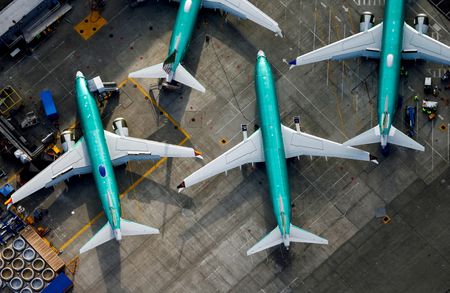By David Shepardson
(Reuters) – Boeing <BA.N> is adding weekly compliance checks for every 737 work area and additional audits of equipment to reduce quality problems, the company said in a memo to employees on Tuesday.
The memo from Boeing Commercial Airplanes President and CEO Stan Deal following the U.S. Federal Aviation Administration’s six-week audit of Boeing’s 737 MAX manufacturing processes that faulted numerous company processes. The FAA has curbed Boeing production following the mid-air panel blowout on a new Alaska Airlines 737 MAX 9 jet on January 5.
“Our teams are working to simplify and streamline our processes and address the panel’s recommendations,” the memo said, noting that employees have to focus on looking out for safety hazards and follow manufacturing processes precisely. “We will not hesitate in stopping a production line or keeping an airplane in position.”
The memo comes a day after FAA Administrator Mike Whitaker disclosed details of the audit found numerous quality issues and the planemaker must have employees “have the right tools and training, having the right engineering drawings and assembling the aircraft in the proper order … It’s really plant floor hygiene.”
Deal said FAA inspectors went deep into the 737 Renton factories in January and February to audit production and quality control and found the “vast majority of our audit non-compliances involved not following our approved processes and procedures.”
The weekly compliance checks for 737 work sites start March 1 and Boeing is dedicating time in each shift for mechanics to complete compliance and foreign object debris sweeps.
Boeing is also auditing all toolboxes and removing any tools not fully compliant and will conduct additional 737 program audits to ensure full compliance.
Deal said workers must “precisely follow every step of our manufacturing procedures and processes. These have been designed to ensure conformance to specifications and compliance to regulatory requirements.”
Deal also said with Spirit AeroSystems Boeing has “implemented additional inspection points at their facility in Wichita. As such, starting March 1, teams there have been ensuring first-pass quality before any fuselages are shipped to Renton.”
(Reporting By David Shepardson and David Gaffen; Editing by Franklin Paul and Nick Zieminski)




